
Locarno is a southern Swiss town and municipality in the district Locarno, located on the northern shore of Lake Maggiore at its northeastern tip in the canton of Ticino at the southern foot of the Swiss Alps. It has a population of about 16,000 (proper), and about 56,000 for the agglomeration of the same name including Ascona besides other municipalities.

Neuchâtel is a town, a municipality, and the capital of the Swiss canton of Neuchâtel on Lake Neuchâtel. Since the fusion in 2021 of the municipalities of Neuchâtel, Corcelles-Cormondrèche, Peseux, and Valangin, the city has approximately 33,000 inhabitants. The city is sometimes referred to historically by the German name Neuenburg; both the French and German names mean "New Castle".
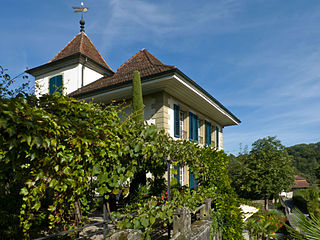
Bremgarten bei Bern is a municipality in the Bern-Mittelland administrative district in the canton of Bern in Switzerland.
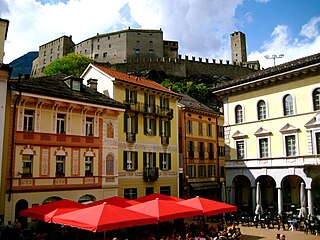
Bellinzona ( BEL-in-ZOH-nə; Italian:[bellinˈtsoːna] ; is a municipality, a historic Swiss town, and the capital of the canton of Ticino in Switzerland. The town is famous for its three castles that have been UNESCO World Heritage Sites since 2000.

Chillon Castle is an island medieval castle located on Lake Geneva, south of Veytaux in the canton of Vaud. It is situated at the eastern end of the lake, on the narrow shore between Montreux and Villeneuve, which gives access to the Alpine valley of the Rhône. Chillon is amongst the most visited medieval castles in Switzerland and Europe. Successively occupied by the House of Savoy, then by the Bernese from 1536 until 1798, it now belongs to the canton de Vaud and is classified as a Swiss Cultural Property of National Significance.
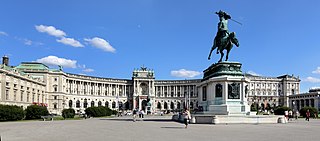
The Hofburg is the former principal imperial palace of the Habsburg dynasty in Austria. Located in the centre of Vienna, it was built in the 13th century and expanded several times afterwards. It also served as the imperial winter residence, as Schönbrunn Palace was the summer residence. Since 1946, it has been the official residence and workplace of the president of Austria.
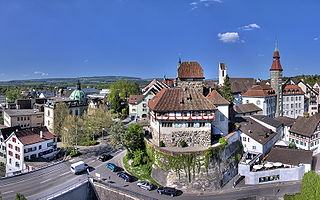
Frauenfeld is the capital of the canton of Thurgau in Switzerland.

Franconian Switzerland is an upland in Upper Franconia, Bavaria, Germany and a popular tourist retreat. Located between the River Pegnitz in the east and the south, the River Regnitz in the west and the River Main in the north, its relief, which reaches 600 metres in height, forms the northern part of the Franconian Jura (Frankenjura). Like several other mountainous landscapes in the German-speaking lands, e.g. Holstein Switzerland, Märkische Schweiz, or Pommersche Schweiz, Franconian Switzerland was given its name by Romantic artists and poets in the 19th century who compared the landscape to Switzerland. Franconian Switzerland is famous for its high density of traditional breweries.

Habsburg Castle is a medieval fortress located in what is now Habsburg, Switzerland, in the canton of Aargau, near the Aar River. At the time of its construction, the location was part of the Duchy of Swabia. Habsburg Castle is the original seat of the House of Habsburg, which became one of the leading imperial and royal dynasties in Europe. It is listed as a Swiss heritage site of national significance.

The Swiss Inventory of Cultural Property of National and Regional Significance is a register of cultural property in Switzerland. It was established according to article 5 of the second protocol to the Hague Convention for the Protection of Cultural Property in the Event of Armed Conflict, which provides for the establishment of national registers of cultural property.

Rapperswil is a former municipality and since January 2007 part of the municipality of Rapperswil-Jona in the Wahlkreis (constituency) of See-Gaster in the canton of St. Gallen in Switzerland, located between Obersee and the main part of Lake Zurich.

Rapperswil Castle is a castle, built in the early 13th century by the House of Rapperswil, in the formerly independent city of Rapperswil.

A rock castle is a type of medieval castle that directly incorporates natural rock outcrops into its defences to such an extent that the rock formations define the structure of the castle. Topographically, rock castles are classified as hill castles.

A cave castle or grotto castle is a residential or refuge castle that has been built into a natural cave. It falls within the category of hill castles. Unlike other types, such castles can only be assaulted from the front, or by drilling through the rock above; the gateway is usually located in the middle of a rock face, which makes it much more difficult to penetrate. Archaeological discoveries have revealed that caves were used as places of refuge as early as the Stone Age. The first medieval cave castles emerged in the 11th and 12th centuries. In the 14th and 15th centuries this type became more widespread, especially in certain parts of France and Switzerland.
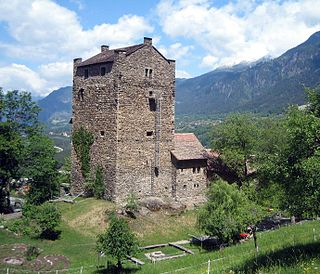
Ehrenfels Castle is a castle in the municipality of Sils im Domleschg of the Canton of Graubünden in Switzerland. It is a Swiss heritage site of national significance. Today it is a youth hostel.
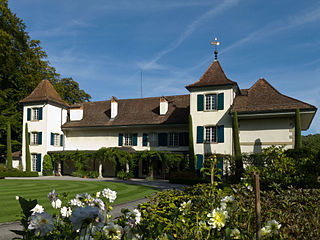
Bremgarten Castle is a castle in the municipality of Bremgarten of the canton of Bern in Switzerland. It is a Swiss heritage site of national significance.

A half tower, open tower, or open-gorged tower is a fortified stone tower in an external wall or castle enceinte that is open, or only lightly constructed, at the rear. Towers of this type were used, for example, in city walls. City gates can also be incorporated into a type of half tower.



















